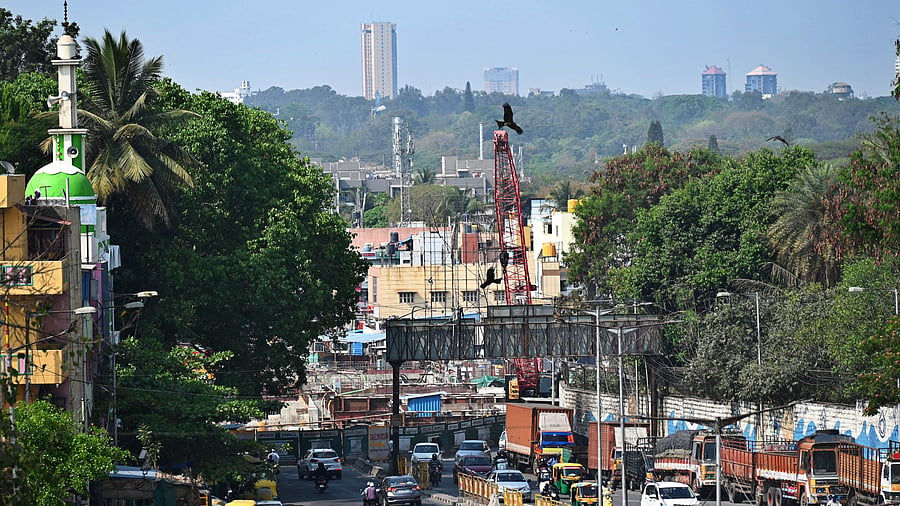
From 2000 to 2004, the Bangalore Agenda Task Force set a new standard for urban governance as a pioneering public-private partnership that effectively aligned private expertise with government operations.
DH File photo
Bengaluru: In 1999, the Government of Karnataka launched the Bangalore Agenda Task Force (BATF), an ambitious experiment aimed at transforming Bengaluru into a world-class city. BATF became a pioneering public-private partnership that redefined urban governance by aligning private expertise with government operations during the years 2000-2004.
Unlike traditional advisory bodies, BATF focused on execution rather than just generating recommendations. It played a catalytic role by working directly with civic agencies, including the Bangalore City Corporation (BCC), Bangalore Development Authority (BDA), and Bangalore Metropolitan Transport Corporation (BMTC), among others. This partnership was unique because it involved private individuals offering their expertise on a pro bono basis, fostering a new era of urban collaboration.
Strong bid to revive BATF
However, after 2004, none of the governments showed interest in wanting the BATF or to bring it back on track. But now, under the current government, Deputy Chief Minister D K Shivakumar, who is also Bengaluru Urban Development Minister, is keen on restarting and further empowering BATF.
V Ravichandar, civic evangelist and former member of the BATF, told DH, that collaboration between government agencies, private individuals, and civil society is imperative for positive change.
“The problem is humongous for the government to fix it on its own; it lacks the necessary capacity and expertise. Complementary skills are useful to identify civic issues and fix them. Currently, there is no focus on the outcome. Just agencies operating in silos. For outcomes, they need to work in sync which BATF had enabled. Plans to improve the infrastructure of the city are multi-agency in construction and execution” he added.
The bureaucracy takes its signal from the political leadership. With the CM and Bengaluru Development Minister driving the BATF platform, the projects adopted by the platform (citizen inputs important on the problems that need fixing which are done through surveys) get fast-tracked. Srinivas Alavilli, civic activist, recalled the contributions made by the BATF but pointed out fundamental issues with such committees. According to him, task forces and expert committees in Bengaluru are problematic due to their tendency to reflect the insights of a select group rather than adopting an inclusive approach. “Their interventions often remain tactical and fail to instigate enduring improvements in civic amenities, inter-departmental coordination, and decentralized governance with active citizen participation,” he remarked.
An alternative according to Alavalli would be to create a Legislative Subcommittee focused on Bengaluru, comprising MLAs from the city alongside thought leaders and civil society representatives from diverse backgrounds.
“This committee could work on developing a legislative agenda and enhancing oversight of executive functions,” he added.
Alavalli suggested that committees should adopt a systems perspective, prioritising the identification of root causes behind poor governance. In his view, the primary root causes of governance issues are a lack of capacity; public agencies are often understaffed and underfunded, which hampers their effectiveness and over-centralisation; the BBMP lacks the necessary financial and political empowerment to operate effectively.
Collaborative approach mooted
Addressing Bengaluru’s issues requires collaboration among government, civil society, businesses, and academia, said Srikanth Viswanathan, CEO of Janaagraha. He observed that BATF did that 20 years ago. “While the BATF was a new initiative over two decades ago to provide civil society a voice, today we need a more systematic, participatory, and inclusive approach. The Greater Bangalore Governance Bill (GBG) by the Brand Bangalore Committee, included innovative proposals like the Greater Bangalore Authority and neighbourhood-level area sabhas, which could significantly improve governance and urban planning. “However, the focus should move from retrograde infrastructure projects like flyovers and tunnel roads to citizen- centric activities like public health, women’s safety, and workforce participation. Also, walkable streets support better access to public transport,” he added.
Former deputy Chief Minister Ashwath Narayan said that sometimes, at the macro and micro level, MLAs will not be able to incorporate the public views. “A body like the BATF with industry experts will act as a bridge between the people and the government and provide advisory role and direction to major projects whether infrastructure, healthcare and education to both the CM and DCM,” he remarked.
Quote -
LOOKING BACK
1. Development through implementation focus resulting in more flyovers underpasses public toilets bus shelters one-ways and park restoration.
2. In an effort to generate revenue the Self Assessment Scheme (SAS) property tax reforms (Swayam Ghoshane) was introduced.
3. Innovative health and sanitation measures like segregation of waste at source door-to-door collection Swachha Bangalore scheme and Nirmala Toilets.
4. During 2000-04 around Rs 700 crores of infrastructure development came through own resources of the city bodies (BDA and property tax reforms of the BCC). This implied less reliance on state government funds which can be deployed for more needy sectors of society (rural and poor).
We will give more powers to BATF: Speaking to DH Deputy Chief Minister D K Shivakumar said that Bangalore Agenda Task Force (BATF ) is still existent. “We want to give it more teeth and powers to stop all illegal construction and documentation in Bengaluru to protect the larger public interest. Bengaluru should be a planned city and we don’t want to leave anything unplanned. We will also ensure more citizen participation in BATF” he said.